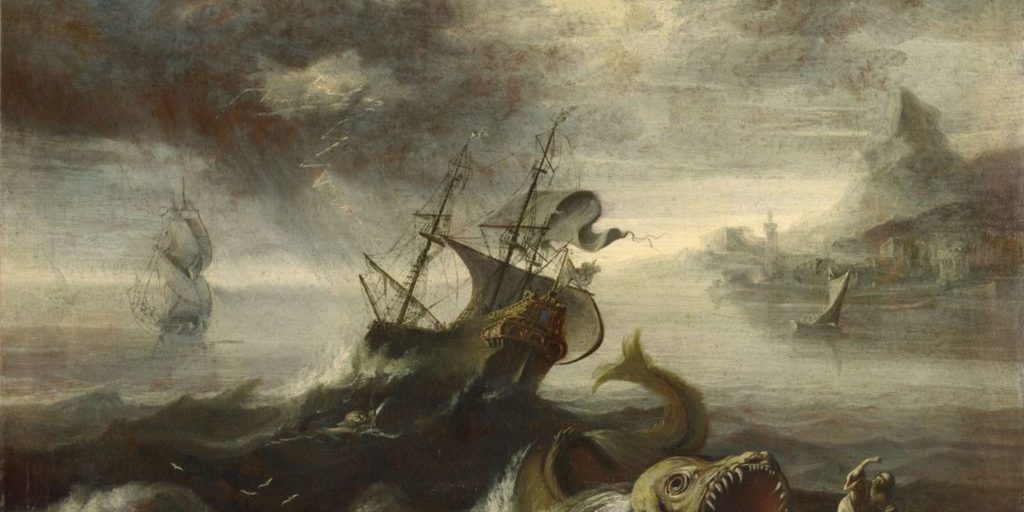
Noticing Literary Cues in Jonah
Jonah is written in such a way as to divulge its meaning to the reader even if that reader has but a meager understanding of the cultural backgrounds that lay behind the text. Although establishing matters of provenance (i.e., authorship, date, geography) is useful and even necessary in the pursuit of a faithful interpretation of Jonah, the focus of this post is on the superiority of reading Jonah first as a piece of literature. In other words, Jonah is laced with literary cues that the reader is intended to discover along the way. What is at stake should the reader focus first on matters of provenance, is that he would likely miss, or not fully apprehend, the embedded literary cues resident in the narrative.
I do not intend to propose a strict bifurcation between the literary nature of Jonah and the provenance of Jonah. I only wish to encourage the reader to see Jonah first as literature, and only then, after a strong understanding of its literary cues, should the reader turn to matters of provenance. Furthermore, I contend that biblical theology should closely follow as the secondary means of interpreting Jonah. A strong grasp of the biblical-theological background of the Bible is more useful for interpreting Jonah than that of understanding its provenance.
Thus, the literary nature and biblical-theological background of Jonah creates a context unto itself. We now turn to the cues in Jonah:
1. Jonah leaves Israel, which is meant to evoke feelings of a self-willed exile.
A self-willed exile is always a bad idea for an Israelite. The land is the sacred space of the people of God (1 Samuel 26:19) and any time an Israelite willfully leaves the land, it is depicted as disobedience, or at least hazardous, and the result is often death (Ruth 1:1-5). This is stated in Deuteronomy multiple times (28:20; 36-37). Our author intends the reader to be cued to something having gone awry with this particular prophet. In Jonah 1:1-3 the author signals the reader that Jonah has entered into grave error and has embarked on a perilous voyage. This cue is most ably apprehended by tracing the author’s literary technique and employing a strong biblical-theological understanding of the exile motif, the Torah, and the consequences of disobedience.
2. The sea and sea monster are meant to cause anticipation of Divine judgment.
When the seas are alluded to in Scripture, it is predictably meant to evoke ideas of chaos and judgment (Genesis 1:1-2; 7:11-24, Exodus 14; Job 26:12; 1 Peter 3:20). Alternatively, to overcome the sea and its monsters or to realize an absence of them is to experience peace and the smile of the Lord (John 6; Revelation 21:1). Therefore, in the book of Jonah the sea voyage cues the reader to a tension and the possibility of coming judgment. This tension is further confirmed in 1:4 as the seas begin to rage. The tensions rise higher when Jonah is thrown into the open sea (1:15). This is what makes 1:17 and the swallowing of Jonah even more surprising. Every tension in the text has driven the reader to the summit of judgment, but instead of judgment, Yahweh visits Jonah with mercy and kindness. The Lord doesn’t appoint the great fish to destroy Jonah as the reader expects; no, the Lord swallows Jonah away to safety.
3. Jonah’s southward geographical descent is meant to reflect his spiritual state.
When Jonah received the word of the Lord to preach to Nineveh (1:2), he promptly disobeyed by traveling south, the exact opposite direction. He left the Northern Kingdom of Israel (2 Kings 14:25) and traveled south toward the seafaring city of Joppa and then west toward Tarshish. Jonah’s physical, geographical descent is meant to reflect a shadow reality of his disobedient, sinful descent. The reader is swept into a vivid, tactile, and ironic experience as Jonah’s disobedience builds anticipation of imminent consequences. ‘Why would Jonah flee the presence of the Lord? This sounds like Adam and Eve in Genesis 3!’ First, Jonah traveled ‘down’ to Joppa. Then he stepped ‘down’ into the ship headed to Tarshish. Next, he went ‘down’ into the bottom of the ship—the bowels, as it were. Then, eventually, Jonah was thrown onto the wiles of the sea where he swam and eventually sank his way downward. Jonah was at the rock bottom of the sea, it would seem (2:6). But even at this point, Jonah was not yet at the bottom of his psychological self (2:5-6). No, the underworld goes deeper ‘down.’ In chapter 2, Jonah confessed when he accomplished his desired end of fleeing the presence of the Lord; he found he hated it (2:4). He felt ‘banished’ from the Lord, but this is what he wanted (1:3)! Jonah had effectively sprinted, sailed, swam, sank, and had been swallowed away as far from the presence of the Lord as possible in this old world.
4. Jonah’s disobedience is meant to show a revealed contrast.
Have you ever noticed how everything and everyone in the story obeys the Lord except for Jonah? The literary cue of disobedience in Jonah is part of the larger satirical nature of the book.
- The waves obey the Lord, but Jonah does not (1:4).
- The wind obeys the Lord, but Jonah does not (1:4).
- The lot obeys the Lord, but Jonah does not (1:7).
- The sailors obey the Lord and fear him; Jonah remains in disobedience (1:14-16).
- The fish obeys the Lord by swallowing Jonah just at the appointed time and then promptly spits him out at just the appointed time (1:17; 2:10).
- The Ninevites repent and obey at the mere preaching of a wayward prophet (3:5). The plant (i.e., vine) obeys the Lord by growing up and then withering at the appointed time (4:6).
- The worm obeys by attacking the plant at the appointed time (4:7).
- The sun and east wind obey the Lord as they join forces to scorch Jonah’s head (4:8).
Everything and everyone obeys the Lord’s sovereign rule except for Jonah. To miss this cue in Jonah is to miss a large part of the authorial agenda, which is to drive home the Lord’s staggering mercy for rebel prophets and pagans alike. His mercy swallows up everyone and everything in this book.
5. The usage of ‘gadol’ (great) is meant to point to the satirical nature of the book.
By positing Jonah is an inspired satire I do not mean the reader to question its historicity. It is simultaneously historical and satirical. Rather, in the book of Jonah, everything is immense and seemingly excessive—out of typical proportion. The Hebrew word, gadol, meaning ‘great,’ appears fifteen different times in a mere forty-eight verses. The wind and the storm are characterized as ‘great’ (1:4, 1:12). The sailors fear the Lord with ‘great’ fear (1:16). The Lord does not appoint just any fish; he appoints a ‘great’ fish (1:17). Nearly every mention of Nineveh is accompanied by a reference to its ‘great[ness]’ and enormity (1:2; 3:2; 3:3; 4:11). The Lord chastises Jonah for failing to see he is not the one who made the plant ‘great’ (i.e., ‘grow,’ 4:10). Jonah is said to be ‘greatly’ pleased by the shade provided by the vine (4:6). The unusually high degree of usage of the word gadol creates a literary cue pointing to irony in the Jonah story. Irony in Jonah is meant to shock, shame, and ultimately convict.
6. The irony in Jonah is meant to point to its satirical nature.
Given Assyria’s profile in Scripture (Genesis 25:12-18; 2 Kings 15-23; Isaiah 7-8, 38:6), to write a story where the protagonist is the Assyrian capital, Nineveh, paints a deep irony into the contours of the narrative. Irony in Jonah is intended to shame Israel, the would-be self-righteous types. Jonah highlights the stark contrast that exists between the stiff-necked and unrepentant Jonah and the Ninevites and pagan sailors who bear all the marks of biblical repentance (1:16; 3:5; 3:10). Jonah, an Israelite, is the antagonist while pagan sailors and wicked Ninevites serve as the protagonists. But, by the end of the narrative the reader realizes that The Lord is the real protagonist, for he is gracious, compassionate, and slow to anger, “one who relents from sending disaster” (4:2).
7. The Book of Jonah is canon dependent.
First, Jonah ends on a cliffhanger. The way the author ends the book demands the reader to resolve the tension in some way. One way to do this is simply to be properly amazed at the overwhelming mercy of Yahweh, but the second way is to see that this story awaits final resolution: what happened to Jonah? Did he ever repent? Why does the Lord remain so patient and merciful? We are left with a deep-pitted and unresolved tension. The last words of Jonah are in response to the Lord’s question, “Is it right for you to be angry…?” Jonah responds, “Yes, it’s right! …I’m angry enough to die!” (4:9). And that is the last we hear from Jonah the prophet, that is until Jesus of Nazareth comes announcing he is the True, Better, Greater, and More than Jonah. The Greater Jonah has come, which is to say everything Jonah was supposed to be, Jesus is. If one does not recognize these literary cues, he is likely to misinterpret the book of Jonah no matter how well he knows the cultural background that lay behind the text. Click To Tweet
Consider the following ironic contrasts between Jonah and Jesus:
- Jonah hates Nineveh and responds with rage. Jesus loved Jerusalem and wept over her.
- Jonah delighted to preach destruction to Nineveh. Jesus delighted to preach forgiveness in his blood.
- Jonah is filled with sin and rebellion, yet the Father mercifully spares him. Jesus had no sin, yet died like a sinner in order to deliver sinners like you and me.
- Jonah was in the belly of the fish and figuratively arose from the heart of the seas after three days, thus foreshadowing the resurrection. Jesus got up from the belly of the earth after three days and was the substance.
If one does not recognize these literary cues, he is likely to misinterpret the book of Jonah no matter how well he knows the cultural background that lay behind the text. However, if one is attuned to these literary cues and commands a strong grasp of the biblical-theological context of the Bible, he will be well equipped to interpret the book of Jonah. When the reader listens for these literary cues and absorbs them into the interpretational process, he will see that Jonah is a story not so much about Jonah being thrown “into the depths” of the sea, but rather being thrown into the merciful and stunningly patient heart of God. By the end of the book, we find The Lord’s mercy is so depthless that it can swallow any sinner, whether pagan or prophet.

